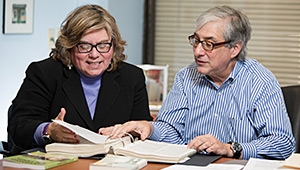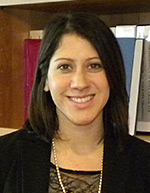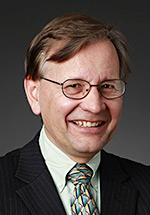

Bridging Legal & Clinical
Is There a Lawyer In the House? Fellowship Integrates Legal, Clinical Expertise
Some of the most innovative clinical training at Einstein – and in the country – doesn't involve white coats.
The Leadership in Neurodevelopmental Disabilities (LEND) program, administered by the Health Resources and Services Administration's Maternal and Child Health Bureau (HRSA) at the U.S. Department of Health and Human Services, funds fellowship positions in an array of allied health professions at Einstein's Children's Evaluation and Rehabilitation Center (CERC). For more than 40 years, LEND has provided graduate-level, interdisciplinary leadership training to improve the health of children with or at risk of neurodevelopmental and related disabilities at 43 sites in the 37 states. This hands-on training is typically undertaken by psychologists, physical therapists, social workers and other clinicians who work with children and adults with disabilities.

Sheryl Dicker with Dr. Robert MarionWith the help of the LEND fellowship at the Rose F. Kennedy University Center for Excellence in Developmental Disabilities, that multidisciplinary mix also includes law students.
Einstein's LEND legal fellowship is believed to be the first ongoing fellowship for law students in the country and permits those from Einstein's sister school, the Benjamin N. Cardozo School of Law of Yeshiva University, to learn from the LEND program's diverse range of clinicians, and vice versa.
"Their eyes are opened," said Dr. Robert Marion, one of the creators of the fellowship who is director of CERC and holds the Ruth L. Gottesman Chair in Developmental Pediatrics. "Students in medicine and other fields usually have no concept of the legal issues in developmental disabilities. This is really synergistic for everyone in our program."
Treating children with developmental disabilities requires a broad range of expertise, because disabilities can have such profound effects on every facet of a child's life. Often, a legal perspective is helpful, especially as children and families face issues related to educational access, foster care or eligibility for government benefits.

Former Einstein LEND fellow, Kristina MajewskiEinstein has recognized that need. Sheryl Dicker, who is a consultant to CERC and an attorney, has been an advocate for children with disabilities for more than 30 years and was appointed by President Clinton to serve on the President's Committee on Mental Retardation. After coming to Einstein, she began talking with Dr. Marion about the need for a legal perspective in clinical training – and the need for a clinical perspective in legal training.
Coincidentally, both Dr. Marion and Ms. Dicker are neighbors with Cardozo law professor Stewart Sterk, and the three began discussing how the two Yeshiva University schools might collaborate to create a new type of learning opportunity. After obtaining funding and developing a curriculum, Einstein launched the LEND legal fellowship in 2009.
Since its creation, half a dozen other legal-medical collaborations have sprung up around the country, Dr. Marion said.
The first LEND legal fellow was Kristina Majewski, a member of the Cardozo class of 2011 who was selected from more than a dozen first- and second-year students who applied. Ms. Majewski focused her work on the transition from special education to adulthood and on the state of deinstitutionalization efforts.

Cardozo law professor, Stewart SterkWorking side by side with the clinical LEND fellows, discussing the same cases, attending the same core lectures, Ms. Majewski said she learned much that she would not have in a more traditional law school fellowship.
"My experience at Einstein taught me to be open to every perspective," she said. "The LEND program does that very well. The work was simply fascinating."
She credits Dr. Marion and Ms. Dicker with being "great mentors" who treated her and other LEND fellows as "equal colleagues."
Just as importantly, her real-world training at Einstein increased her desire to serve as an advocate of children with developmental disabilities.
"The experience instilled a passion in me to help make children's lives stronger," said Ms. Majewski, who has a brother with special needs. Since completing her fellowship and graduating Cardozo, she has gone on to earn a prestigious Fellowship in Disability Policy Leadership from the Association of University Centers on Disabilities, in Washington, D.C.
Ms. Dicker said she hopes that LEND legal fellows like Ms. Majewski will share the benefit of their time at Einstein with other attorneys and ultimately bring a better understanding of disabilities to the legal profession.
"This is an aging field," she said. "We need to grow a new cadre of lawyers who are versed in disability law. Being an advocate is only going to become more complex."
Helping lawyers gain that real-world experience in disabilities is important to Cardozo as well, said Mr. Sterk.
"We don't have anything internally here that would offer the same type of experience," he said. "This is the type of opportunity that teaches students how a body of law works, how legal decisions are made, in the real world."
He added, "It's fortuitous that when Einstein was looking for a partner in the fellowship, it had to go no further than its sister law school. This is a net benefit for everyone in the university."
Editor's Note: As we prepared this story to post, we learned that Ms. Majewski has been selected from among hundreds of top legal candidates to work in the Disability Rights Section of the Civil Rights Division at the Department of Justice. In this role, Ms. Majewski will be working specifically as litigation support on the Olmstead Enforcement team (whose focus is deinstitutionalization). She noted, "I attribute my knowledge in this area to my fellowship at Einstein, where Ms. Dicker supervised my final project centered on the 1999 U.S. Supreme Court Case - Olmstead vs. L.C. and community living for individuals with disabilities."
Posted on: Thursday, February 21, 2013


